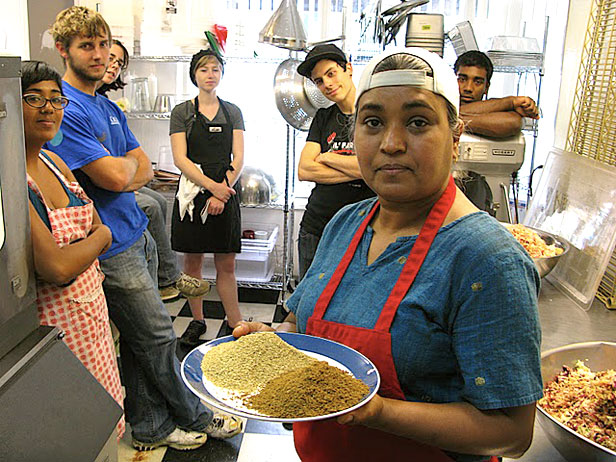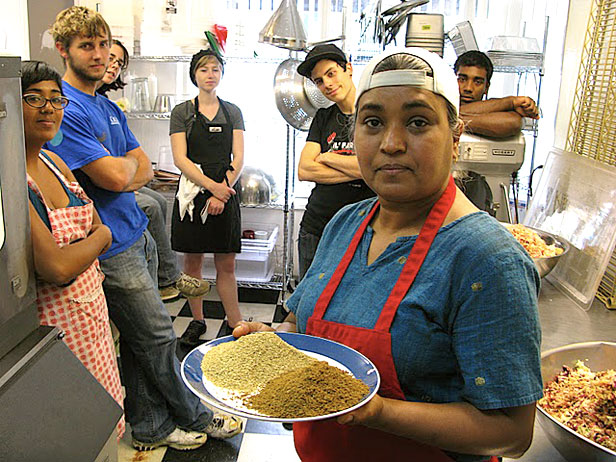 An underground legend goes legit: Vimala Rajendran with staff in her gleaming new kitchen. (Kathryn Stein photo)
An underground legend goes legit: Vimala Rajendran with staff in her gleaming new kitchen. (Kathryn Stein photo)
In our New Agtivist interview series, we talk to people who are working to change this country’s f’ed-up food system in inspiring ways.
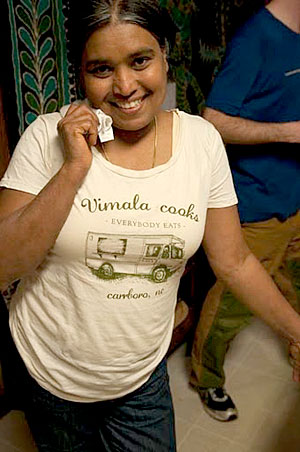 When Vimala cooks, everyone eats–well. (Shannon Barry photo)When the going gets tough, the tough get cooking. That’s the main lesson I’ve gleaned from my friend Vimala Rajendran, a legendary underground cook in Chapel Hill, N.C., who has recently gone legit by opening Vimala’s Curryblossom Café.
When Vimala cooks, everyone eats–well. (Shannon Barry photo)When the going gets tough, the tough get cooking. That’s the main lesson I’ve gleaned from my friend Vimala Rajendran, a legendary underground cook in Chapel Hill, N.C., who has recently gone legit by opening Vimala’s Curryblossom Café.
Doing justice to her life story would require the skills of a Salman Rushdie or a Mira Nair: childhood in middle-class suburban Bombay, peeling cardamom at her mother’s knee; youthful marriage to an academic scientist and passage to the United States; a stint as a young housewife and mother, expanding her culinary horizons in cosmopolitan Ann Arbor; survivor of a violent, collapsed marriage in Chapel Hill; sudden status as a penniless single mother of three without job or immigration papers; and then salvation through underground community dinners cooked and served at her home. And through it all, the scent of aromatic spices gently sizzling in ghee and the chop-chop-chop of a knife on a cutting board.
What makes Vimala, 52, a New Agtivist is her commitment to Chapel Hill’s extraordinary surrounding “foodshed” — a fancy name for a regional food ecosystem, encompassing its growing, distribution, and consumption. No foodshed can thrive without a robust market for local produce and a cadre of people who know what to do with it; Vimala has done more than her bit to support both. At her community dinners and now at her restaurant, she relies on the produce of her friends in the farming community. She makes it work economically by buying in bulk when produce is abundant, often taking top-quality but cosmetically flawed goods the farmers might otherwise not be able to sell. She also serves the foodshed as a cooking teacher.
Over the years, dozens of people — most of them young — have entered her tutelage barely knowing how to boil water and emerged with the ability to whip up vibrant, delicious Indian food. (I know Vimala’s terrific food firsthand: I’ve had the pleasure of cooking with her once, and attended her community dinners many times.) Vimala is also commited to accessibility. Her community dinners were pay-what-you-can; and the prices at the new cafe are quite a bargain, given the quality of ingredients and level of cooking skill.
Just as her Curryblossom Café is now, her community dinners were always a family affair. They were run by her and her second husband, Rush Greenslade, 61; several of the now-adult children from their respective previous marriages; and a rotating cast of friends who cook in exchange for food. (The same setup holds sway at the new restaurant, except that the workers get paid a living wage.)
With her new restaurant set for a grand opening July 17 (it had a “soft opening” two weeks ago), I caught up with Vimala via phone from the kitchen while she and her friends prepped for the dinner rush .
Q. How did you get into cooking in the first place?
A. My earliest memory was food. I was always hungry as a child, maybe 2 or 3 years old. The food I remember was never on time to feed my insatiable hunger. So I would just hover around my mom asking her, What’s next, when is it going to be ready? So then to put me in a learning circumstance, she would just say, “Here, peel this cardamom.” So my little hands got into food preparations so early in life.
And at age six, I would insist that I had to go the market with or without my parents to do the shopping. I went and shopped for the stuff twice a day, because we didn’t have a refrigerator growing up. And even in our urban or suburban area in Bombay, my family always had a small pot of banana plants and a tomato plant, or something like that. We grew our own green chilies. So I was into food very early on in life. And then in the 1980s I came to the United States to Ann Arbor, Mich., as a dependent spouse, and wife of a scientist — it just became a great opportunity for me to discover food, not just from distant parts of India that I had not encountered before back in Bombay, but also from all over the world. So I can handle these cuisines from various different countries, having had neighbors and friends who willingly and openly shared their recipes with me. Folks from Egypt taught me to make a special version of lentils and rice, and falafels from Lebanese friends, and I learned to make baklava from Middle Eastern friends who showed me layer by layer how to handle phyllo.
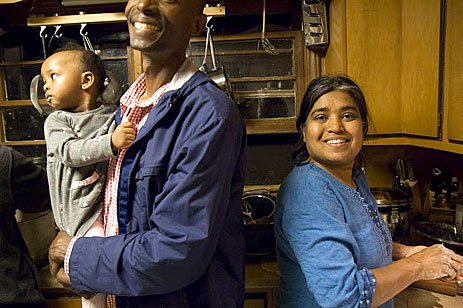 Vimala with friends in the heat of a community dinner. (Shannon Barry photo)Q. You gained quite a following for your underground community dinners in Chapel Hill. How did you start?
Vimala with friends in the heat of a community dinner. (Shannon Barry photo)Q. You gained quite a following for your underground community dinners in Chapel Hill. How did you start?
A. In 1992 I was in a difficult family situation. My neighbors in Chapel Hill suggested that I cook a meal and the women in the neighborhood would invite their friends. I took a lot of time preparing it — salmon and lamb, chicken and all kinds of desserts — just Indian foods, Indian foods that I liked to make. And during that meal, there was one person from India who said, “Ladies, this is the best Indian food ever. This reminds me of food in India. It has transported to me to places so familiar, and we’ve got to take this to the next level.”
Eventually, the broader community also reached out to me. People would say, “The food is good, keep cooking and we will come.” We were able to raise our monthly rent of $350, and there was always food. So I realized if I cooked, all my friends and my children and I could eat healthy food.
Q. By the time I started attending your dinners in the mid-2000s, you were getting a lot of your ingredients from local farmers. How did that supply system begin?
A. That happened six or seven years ago, when I started building relationships one by one with the local farmers. A lot of young people [in the Chapel Hill area] were going into farming, whether as farmhands on established farms or on their own. Many of them were my children’s age, and even attended highs school with my kids. That these are farmers who I have known as friends, and young people who are the same age as my children, made the relationship really special. And then knowing John and Cindy [Soehner] of Eco Farm — that was a natural relationship because their children were in school with my kids.
Q. Yet you were cooking those fabulous meals on a shoestring. How could you buy from local farmers while also keeping costs low enough to make it work for you?
A. Well, having grown food myself and also valuing grown organic food so much; I decided I would not, if I could help it, bargain for better prices. So I always let the farmers set the price. An example being, tomatoes are in great abundance at this time, so there’s one farmer who says he’ll give me his entire farmers market surplus at 75 percent off market price. I said, This is great, because I just feel uncomfortable bargaining for food. I turn around and give great amounts of cooked food to the farmers for them to enjoy.
But it’s difficult. Someone recently called me and said, “There’s a great abundance of tomatoes right now, we sell them at $3 per pound, would you like to buy 50 pounds for $2 a pound?” and I said look, I have these two other arrangements with other farmers, and that is one is giving me free tomatoes, another is giving me tomatoes for a dollar a pound, do you think you could match somewhere in between? And that was a very uncomfortable thing for me to do, but I feel that’s something I have to do for the sustenance of the restaurant now. So there’s something that changed from our first basement apartment where the rent was $350, to renting a house in Chapel Hill, to running a restaurant now.
Having grown food myself and also valuing grown organic food so much; I decided I would not, if I could help it, bargain for better prices. So I always let the farmers set the price.
Q. How did you get funding to start a restaurant at a time when banks are hoarding cash and refusing to lend?
A. Well, credit is tight, and we couldn’t get a bank loan. So, we went to the community. I would talk to anybody I could reach in town, saying “We have a possibility, what do you think?” And within five days, we raised $80,000. And they’re all interest-bearing loans, except for one person who wrote a $15,000 interest-bearing loan check, and a few days later he called me and he said, “Five thousand of that has to be a gift to you for the mentoring and community building that you do for so many, and the affect of your work is immeasurable, I want to give you a gift.”
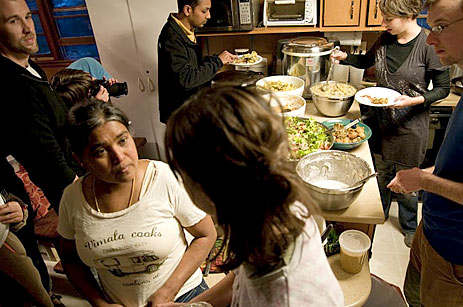 Dinnertime at Chez Vimala. (Shannon Barry photo)Q. So how is it switching from cooking at home to cooking in a professional kitchen?
Dinnertime at Chez Vimala. (Shannon Barry photo)Q. So how is it switching from cooking at home to cooking in a professional kitchen?
A. It’s been a learning experience for all of it, the commercial equipment being bigger. It’s great in a way — having a walk-in refrigerator is a dream, we can even put things on a cart and roll it in. Also, the sky’s the limit as far as accepting produce that the farmers bring to our door. They exchange food with us and hang out, and I send food to their farms that are already cooked using their produce. So we have quite a few farms we are sourcing from, if you can look on our website, I think they say the farms, close to ten farms in the area selling us stuff.
The best thing about having had the community dinners at the house is that those folks know they can come here and actually mingle with other people who are dining and build community. So that continuity is something some new restaurants don’t have, and I’m just so honored that I can continue the tradition and there’s a sense of being a good neighbor and having a sustainable respectful relationship with the farmers and the land that we’re connected to through them. To have that connection — when I hug a farmer, it seems like I’m hugging the Earth that they’re working from. It’s so precious. I feel if I cannot dig the Earth, someone does for me, and a hug from a farmer means the world to me.
Q. What advice would you give for a young person who wants to start a community-oriented food business?
A. I believe — from so many personal experiences in my life that I’ve had to overcome — that if I can do it, anyone can do it. If a young person wants to go into food production, every community has an abundance of resources. I would advise them to talk to anyone they can make eye contact with and anyone who will listen, and then the word gets out, and people begin to say, “Hey, have you thought about partnering with this person?” Because there are other people who have had the same struggles, who have either overcome them or who can together overcome and solve the problem.
Q. Ok, it’s 7 o’clock at night and you’re relaxing at home, and some friends drop in. What do you cook for them?
A. I say, hey, take a seat, what do you want to drink, put some music on — that distracts them for 10 minutes or so — and I have already put on a mung dal which will take about 15 minutes to become dal, and as I’m talking I’m also putting on brown basmati rice, and while those two things are beginning to come to a boil, I’m already chopping onions and the local harvested vegetable of the day — if it were today, it’d be squash and tomatoes — just chop it up, turn on a little bit of oil, put in a few seeds, mustard and cumin, and put in the chopped onions, then put in the vegetables and maybe turmeric for color and good measure and health, and that’s it. Just put a lid or the cover on the baji — a vegetable cooked with no sauce is called a baji — and that’s it. Soon, you’ll have three items all ready. If there’s no time to fry up a pappadam, potato chips will do. You know, you have to have something crunchy.
Q. Does tomorrow evening sound good? I’ll bring the chips!

